- Increasing Self-generated Revenue and Streamlining University Operations
- Financial Status of Iwate Prefectural University
- Expenses per student and per faculty member (Academic year 2013)
- Revenue and expenditures for Academic Year 2013〈Revenue〉
- Revenue and expenditure for Academic Year 2013〈Expenditures〉
- Revenue and Expenditure for Past Five Years
- column4:Vision and Plan for Human Resource Cultivation for Administrative Office in Iwate Prefectural University
In the 2013 academic year, with the efforts of strategic acquisition of aspiring students, revenue from student payments as tuition, matriculation and examination fees have increased because of increased the number of applicants and students. As well as continuous efforts from the last year to acquire competitive fund, commissioned research fees and joint research fees, we enhanced the regional collaboration between industry and academia and support business for student employment.
In addition to budget execution such as rechecking and emphasizing on the business contents, we established and promoted “enhancing educational ability” as a purpose-specific funding resource to improve the quality of education.
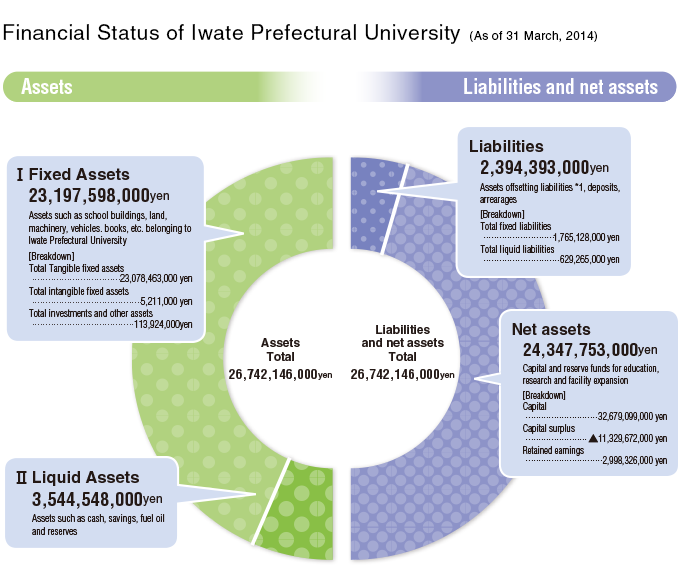
※1 “Assets offsetting liabilities” is a special measure for public university corporations, used so that depreciation does not affect the calculation of profits and losses. When fixed assets are acquired, an amount equivalent to these assets will be calculated as liabilities, and whenever expenses are incurred from depreciation, the amount will be reserved to income.
(Note) Numbers have been rounded off so there may be cases in which numbers do not add up to the totals.
Total educational and research expenses for Iwate Prefectural University were 5,500,930,000 yen for Academic Year 2013. Educational expenses per student were approximately 890,000 yen, including education expenses, education and research support expenses, and part of faculty personnel expenses. Research expenses per faculty member were approximately 2,520,000 yen.
● Education and research expenses
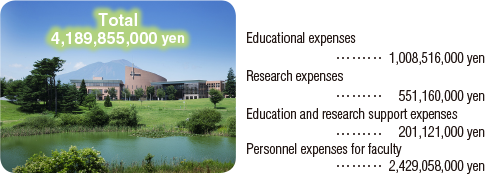
● Education expenses per student
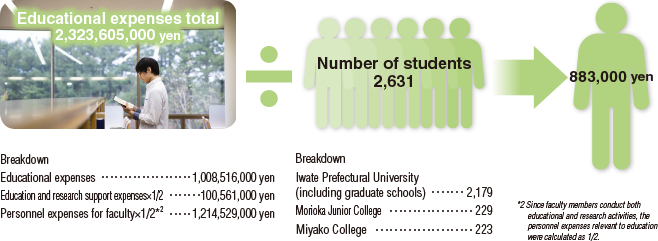
● Research expenses per faculty member

Operational subsidies from Iwate Prefecture account for 67.2% of Iwate Prefectural University’s revenue. Self-generated funds, excluding tuition, matriculation and examination fees, and research income from collaborations between industry and academia account for 30.6% of the revenue.
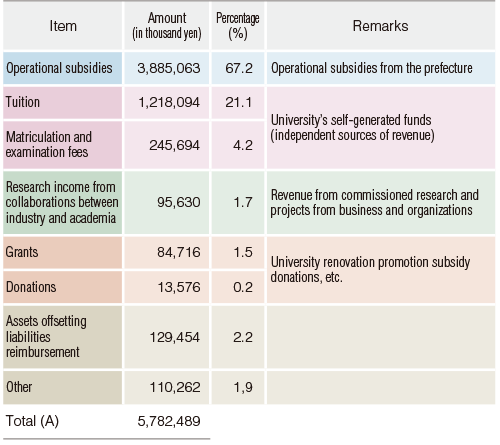
※Assets offsetting liabilities reimbursement is the monetization of the match asset depreciation amount from assets offsetting liabilities.
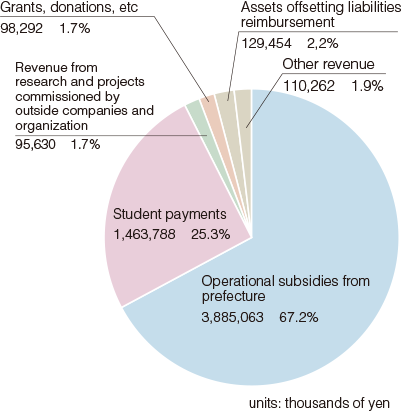
Education and research expenses account for approximately 31.9% of expenditures.
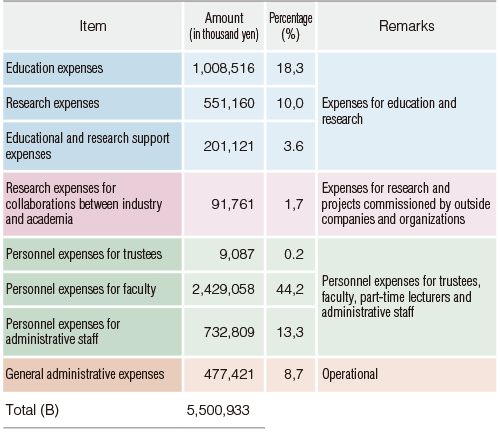
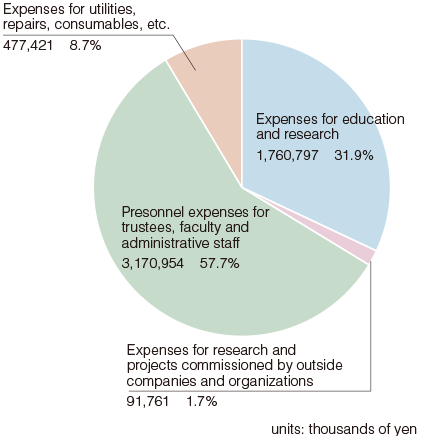
Revenue and expenditures for Academic Year 2013(A-B) 281,556,000 yen
Approximately 70% of revenue is from operational subsidies provided by the prefecture, and although according to the prefecture’s calculation rules there will be a downward trend (a reduction of 0.7% each year), we have made efforts on the increase revenue by the rise in student payments, acquirement of external funds and utilization of grants.
Regarding expenditures, due to increase in energy cost of utilities and in expense which costs machineries’ renewal of on-campus information system, the overall expenditures for the 2013 academic year were approximately 123,430,000 yen higher than the previous year.
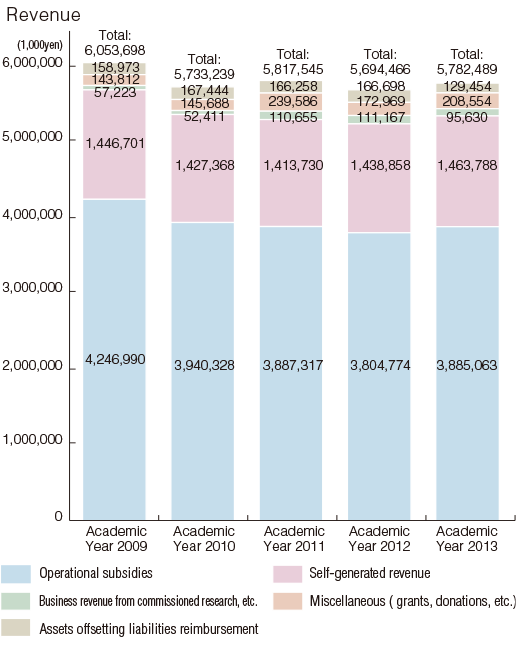
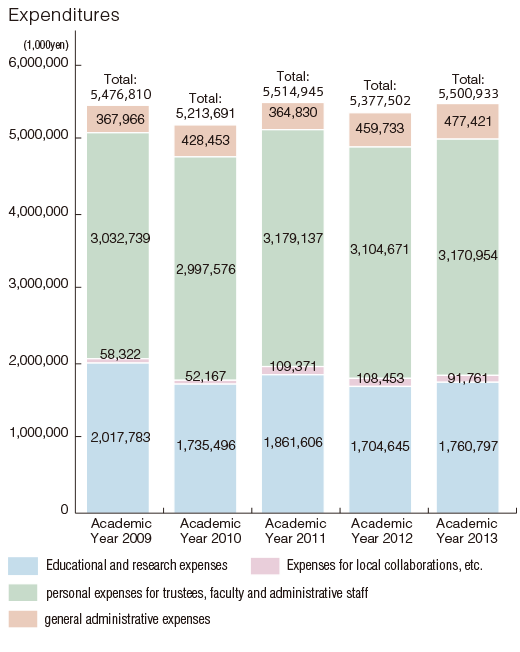
To promote human resource cultivation for administrative office staff, we established “Human Resource Cultivation CFT for administrative officers in Iwate Prefectural University” in the year of 2012 and we discussed and made a report what desired staff is and the expected ability the staff should have . By using the report for reference, the basic principle for human resource cultivation at the office was indicated and the Vision and Plan for Human Resource Cultivation for Administration Office in Iwate Prefectural University was designed to promote approach for human resource cultivation such as various systems and practical trainings to support for voluntary self-development and its framework to implement.
For the vision of cultivation, “the staff who can plan independently and achieve it cooperatively with teachers from students’ and local perspectives in anytime in order to realize the founding principles” is indicated to be a desired staff and we established following three basic attitudes. ① make the system to sustain the growth of staff ( staffs who are aware of one’s role as a university staff and are able to handle internal and external environmental changes flexibly while sophisticating the expertness with the mind of development) ② make the environment where human resource can develop (workplace where supporting self-development and self-realization through business with placing emphasis on rewarding job for each individual) ③ make the environment where is comfortable for working (the place where the staff is able to fully display their expertise, willingness, and ability with harmonize relationship with the family and community life)
For the plan of cultivation, we are also going to promote reformation of the practical training system, introduction of job-rotation for career development, and streamlining of personnel evaluation system to realize development and improvement of the expected potentiality based on the basic principles of the cultivation vision.







